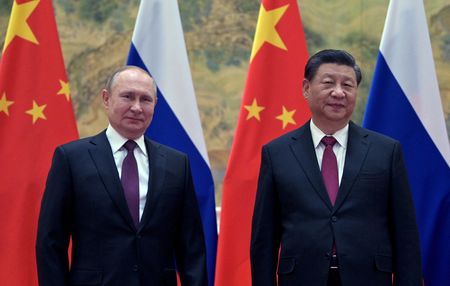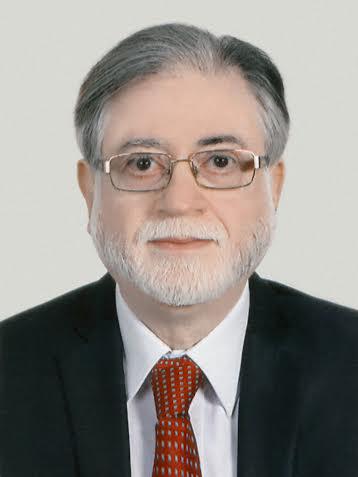
Russia-China Axis: Consolidation of Global Geo-strategic Polarisation

President Putin’s recent visit (4th February) to China and its overall outcome has further consolidated the global geo-political and geo-strategic polarisation, the contours of which had emerged some years ago. The visit assumes particular significance in the context of strained relations between China and USA and the mounting tensions between Russia and the US led NATO over the perceived threats to Ukraine’s sovereignty and territorial integrity from Russia which in 2014 had annexed Crimea and is now alleged to be supporting the separatist forces in East Ukraine.
Before discussing the highlights of President Putin’s visit, it would be worthwhile to recall that the relations between the former USSR / Russian Federation and the People’s Republic of China (PRC) have seen several highs and lows in the past seven decades to reach the current levels often described as “axis of convenience” to counter the USA and allies. Ever since the advent to power of President Putin in 2000, there has been a notable incremental strengthening of relations between Russia and China. Both “Pull” and “Push” factors have been instrumental in bringing the two global powers closer to each other.
During the last two decades, Russia and China have focussed on complementing and supplementing each other’s material needs, which has acted as “Pull factor”. As a result, the two-way trade has crossed $100bn mark with no serious issues on balance of trade. Energy has emerged as one of the key sectors which offers a win-win situation for Russia as a supplier and China as an energy deficient country. Infrastructure projects have been completed /are in advanced stage of construction to enhance connectivity. Cooperation in defence sector is also on ascendency, reflected in Russia’s defence supplies, joint ventures and joint military exercises.
As a parallel stream, China and Russia are seeking to act as key players in regional organisations such as SCO and BRICS; the stated objective is to promote the narratives of emerging economies on issues of security and development such as terrorism, ethnic separatism, religious extremism, reforms of institutions of global governance, protectionism, globalisation, multi-polar world. The real objective is to play a vital role in shaping the global agenda and writing the international rules rather than being governed, guided or dictated by the West led by the USA. The New Development Bank is the BRICS alternative to World Bank and IMF and its objective is to mobilize resources for infrastructure and sustainable development projects in BRICS and other emerging economies as well as developing countries, which fail to enlist support from the West-dominated international financial institutes and mechanisms.
The pressure from the West particularly the US and EU on Russia and China is the push factor and responsible for a situation when China and Russia are now working both separately and together to counter the US influence in political, economic and security domains.
One of the key reasons for the strained relations between Russia and the USA/EU is the tug of war for influence in the post-Soviet space which Russia considers as its “Near Abroad” and its natural sphere of influence. Since the Cold War ended, NATO has expanded eastwards by taking in 14 new countries, including the states of the former Warsaw Pact and the three Baltic nations that were once in the Soviet Union. Russia considers this as a threatening encroachment towards its borders. The NATO announcement in April 2008 that Georgia and Ukraine (two of the former Soviet Republics sharing borders with Russia) will be admitted into NATO at an unspecified date was an important factor in Russia-Georgia war (August, 2008) and Russia’s recognition of the independence of Georgia’s breakaway regions Abkhazia and South Ossetia in 2008, and later Russia’s annexation of Crimea in Ukraine in 2014. The current Ukraine crisis is another episode in the renewed cold war between Russia and the West.
As regards the US and China, the two countries have been at loggerheads for some time now. Reasons are bilateral as well as regional and global. The two sides are locked in a trade war over huge trade balance in favour of China. The US is engaged in promoting US-Japan-Australia-India alliance (QUAD) to check China’s alleged expansionist policies in South China Sea and Indo-Pacific Ocean. For over two years now, the USA is vigorously campaigning to promote globally an anti-China sentiment in the wake of China’s perceived role in the spread of Covid-19 pandemic, and its alleged attempts to derive economic benefits by acquiring distressed assets while the rest of the world was fighting a war against the corona virus originating from China.
The comprehensive joint statement issued at the end of President Putin’s visit is explicit in underlining several areas on which Russia and China claim to have convergence of views; expectedly these are all directed against the USA and its allies and partners. Some of the key elements of the Joint Statement are highlighted here:
1 Russia has reaffirmed “its support for the One-China principle”, and confirmed “that Taiwan is an inalienable part of China”, and that Russia “opposes any forms of independence of Taiwan”.
2 Both Russia and China have explicitly opposed the “further enlargement of NATO” and called on the North Atlantic Alliance “to abandon its ideologized cold war approaches—“
3 In an obvious reference to QUAD, Russia and China have declared that they “stand against the formation of closed bloc structures and opposing camps in the Asia-Pacific region and remain highly vigilant about the negative impact of the United States’ Indo-Pacific strategy on peace and stability in the region”. In this context Russia and China have claimed that they have “made consistent efforts to build an equitable, open and inclusive security system in the Asia-Pacific Region (APR) that is not directed against third countries and that promotes peace, stability and prosperity”.
4 Further Russia and China have expressed serious concerns over the “formation of the trilateral security partnership between Australia, the United States, and the United Kingdom (AUKUS)”, alleging that “such actions are contrary to the objectives of security and sustainable development of the Asia-Pacific region—“,
From India’s perspective, Russia and China have declared their intention to “develop cooperation within the “Russia-India-China” (RIC) format. India remains committed to the objectives of the regional fora such as BRICS, SCO and even RIC. For a meaningful cooperation, much would depend on China’s response to India’s initiatives for resolving the border standoff and securing peace and tranquility along the India-China borders.
Needless to add that prolonged confrontation between global powers may at some point put India (and other neutral countries) in a tight spot while dealing with Russia, China and USA. So far India has successfully stayed away from being a part of any alliance while preferring to forge strong partnerships. India believes in building relationships with individual countries on merit and taking into account its own national interests. It has made it abundantly clear to its partners that it is not India’s policy to build relations with one country at the cost of the other.
If the current trends persist, the Russia-China axis is likely to grow even stronger, and may even develop into a formal alliance. It can act on the one hand as a balancing force vis-à-vis US and its allies and promote multi-polarity in world affairs. At the same time, the axis between the two veto-wielding powers can add to global tensions and confrontations. The world leaders must find a way out diplomatically and through negotiations to be sensitive to the sensitivities and security concerns of each other, avoid confrontation so that the world’s peace and tranquility, development and prosperity are not jeopardised.
*****************
Disclaimer
The opinions expressed in this article are the author’s own and do not reflect the views of Chanakya Forum. All information provided in this article including timeliness, completeness, accuracy, suitability or validity of information referenced therein, is the sole responsibility of the author. www.chanakyaforum.com does not assume any responsibility for the same.
Chanakya Forum is now on . Click here to join our channel (@ChanakyaForum) and stay updated with the latest headlines and articles.
Important
We work round the clock to bring you the finest articles and updates from around the world. There is a team that works tirelessly to ensure that you have a seamless reading experience. But all this costs money. Please support us so that we keep doing what we do best. Happy Reading
Support Us





















POST COMMENTS (1)
Mukesh.Naik